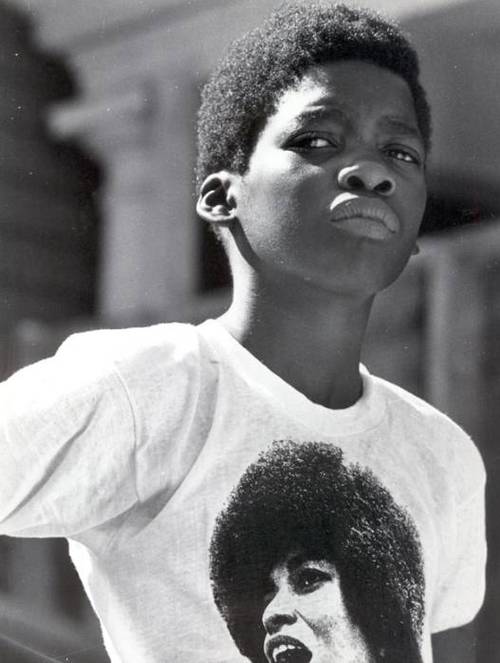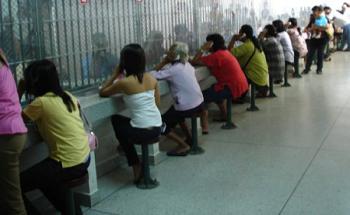Serendip is an independent site partnering with faculty at multiple colleges and universities around the world. Happy exploring!
Voice

Consciousness
I posted the picture below because I was introduced to the Prison Industrial Complex by learning about Angela Davis. Every time I think of prisons I can't help but think of her movement and her books. I also think that the fact that a black boy is wearing a shirt of her speaks to the facts we've been learning in class about the incarceration of black bodies and the inability of schools to respond to their needs. However, this guy perhaps has some consciousness, I see him as a direct contradiction to a system that wants him to fail. By wearing an Angela Davis shirt, he is speaking his consciousness and at the same time standing for those who like him that have been chased by the prison, schooling, etc. system.


Transformative pedagogy
As many of you know, I missed class this past Thursday and Friday to go to the annual Peace and Justice Studies Association meeting, which was being held at Tufts. The whole conference was really great and picked up on so many themes that we’ve been discussing in all three classes. In particular, a session called “Living Our Way Into the Answers: A Workshop on Transformative Pedagogy” really tied in to what we’ve been doing in class. The workshop was really interesting because out of the 30 or so participants, it ended up being split relatively evenly between students and professors. So, while much of the conversation about what transformative pedagogy means for students echoes the things we’ve been talking about amongst ourselves, hearing the teacher-perspective was really fascinating. Beyond the obvious conversation about how to introduce radical pedagogy in a system obsessed with learning objectives and outcomes was the emotional drainage many professors felt – like they just didn’t have the energy to be “transformative” anymore. This is something I haven’t really thought of in terms of my own professors or my friends who aspire to be transformative teachers one day. I also talked about our 360, and got a lot of questions from interested professors about what it’s been like.

Educational Debt: What is specifically owed?
For two days now, I have been thinking about the term, "eduactional gap" mentioned in Girl Time. I think it is a more accurate term than the acheivement gap. I have always disliked this term because it implies that this gap, which never seems to closes, is the fault of the students who are "low-acheiving." It implies, much like in Haney with the female offenders, that it is the responsibility of the student to make up the difference. I used to be all for individualism, which Meiners mentions, but now I see how our society's mindset on individualism can obscure reality and make people believe that the conditions of their lives, good or bad, are a result of their own actions...or lack of action. When, in fact, systems of oppression play a huge, and yet distant, factor in everyone's lives whether to an advantage or disadvantage. I 100% agree that the gap in our education is actually a collection of overdue debts, particularly to inner-city youth. However, as I write this, I am not sure about what exactly is owed us--yep, that includes me--to succeed. What kind of reformation needs to happen? And is it the responsibility of the students who are negatively impacted by the "gap" to make change? This debt that we speak of is more than money, it is SO big--it's like asking to undo the history of racism! This seems highly impossible even though I really want to be optimistic.

Prison and School Across Music, Television, and more
http://www.youtube.com/watch?v=v7gV5C5mB7A
http://www.youtube.com/watch?v=OG3ieifrqyQ
http://www.youtube.com/watch?v=Sw9DADUh490
http://www.youtube.com/watch?v=sBg7AqXRwqg
http://www.youtube.com/watch?v=kR2wfLyT-b0&feature=related
http://www.youtube.com/watch?v=1GZZ13rJsus
http://www.youtube.com/watch?v=Mb1ZvUDvLDY
This is my high school. To give you a picture of how many kids were housed in this school here is following statistic: My graduating class was over 500 students. This does not include students who didn't quite make the cut and all the rest of the school population.

Visiting hours in prison.

Fighting can be entertaining, if you're the mayor
Here are two youtube videos I would like to juxtapose having to do with a real fight amongst students from my hometown and then a staged wrestling match that the mayor involved herself in. It seems atrocious to me that the mayor involved herself in a staged fight (a form of entertainment it seems) and then come down so harshly when students perceive a real fist fight as a form of entertainment. What example is she setting? Also, I love how the news station is chastising the students for videotaping the fight, but yet they continue to show the video.
News clip of students fighting
News clip of mayor discussing her staged wrestling match
This might seem directly related to prisons, but it does lend to conversations about who is allowed to participate in certain acts (the right to be violent, perhaps?) and who is punished for such acts. It also demonstrates the role of schools as punishers, but what does the punishment of a suspension really do?

Voice Paper
Through the process of research professors are able to enter an academic conversation with goals that range from solving a social problem to giving voice to particular communities. Interviews, surveys and participatory observation serve as channels that seek to deepen and broaden our understanding of certain groups of people. What is done with the results of months of data collection can range from a change in policy, to simply sharing the findings with other academics. What happens when research is conducted, policy does not change and communities are left “damaged”? By using Eve Tuck’s desire-based research, I will explore the ways in which research can either give voice to or silence communities. Are researchers truly giving communities a voice, even if the act of research is simply a representation of their stories? Who is listening to these voices besides the researcher and the academic community? What is the purpose of research if voice and/or change are not outcomes?

OZ clip
This is a video that Dan and I watched together while reading though Right To Be Hostile. It's a "Crazy prison riot".
http://www.youtube.com/watch?v=8LWbxSZ2Nxw
We invite you to consider what this does to people's perceptions of prisoners? And contemplate what goes through our mind when we see a headline that includes the words "prison riot".

Alison Bechdel joins the conversation
among HSBurke -- “Showing each other our cracks and admitting that we don’t have it all together is, in my opinion, something our group needed. Thank you for your honesty--
Michaela --I'm grateful that… you all don't "have it all together" in the way I feared--that everyone else had some intstruction manual for getting through life that I just never picked up on--
and Sara --I think most students at Bryn Mawr feel that everyone else around them is doing better then them… I realized last semester that everyone else felt exactly as I did- behind… like everyone else was flourishing but them. I began to wonder, in this environment that is supposed to be so empowering, why so many students felt so helpless and inadequate…maybe …we are constantly measuring ourselves up to impossible standards; grades that we have imagined for the people that seem to be flourishing --->


Assignment Due as You Return from Fall Break
A number of possible venues for activism have been emerging from our conversations (giving feedback to the Mural Arts Program, and/or offering an alternative form of art-making in some of the neighborhoods we visited on our tour? working with YASP on a door-to-door campaign? advocating for the future of Perry House? what other activism is likely to emerge during the next 6 weeks, as we spend time inside The Cannery?).
We would like you to 1) structure your final work in this 360°around one of these actions and also 2) find some way to present those projects to the larger bi-co community (or beyond it). A number of these will need advance work (especially if we are to co-ordinate w/ others outside the bi-co), so we'd like to begin brainstorming together the directions in which we might go, both individually and collectively.
By 5 p.m.on Sun, Oct. 21 (the day we return from break): please post AS A COMMENT TO THIS POST a short description of the sort of activism which interests you, and any ideas you have about what particular form this action might take.
We will then begin having shared conversations about when and how to move forward ….

This American Life podcast
Hi everyone- this is the link to the This American Life podcast I was talking about earlier in Voice class about the law passed in Alabama: http://www.thisamericanlife.org/radio-archives/episode/456/reap-what-you-sow
I also found another one that looked interesting while looking through the archives: http://www.thisamericanlife.org/radio-archives/episode/414/right-to-remain-silent
I haven't fully listened yet but sounds like it might be relevant to our silence class!


